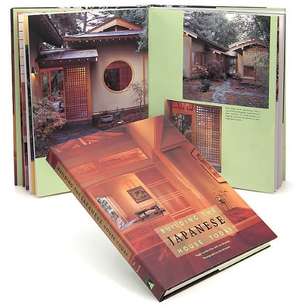Building the Japanese House Today
Autor Peggy Landers Rao, Len Brackett Ilustrat de Aya Bracketten Limba Engleză Hardback – 13 oct 2005 – vârsta de la 13 până la 22 ani
Preț: 168.45 lei
Nou
Puncte Express: 253
Preț estimativ în valută:
32.23€ • 33.74$ • 26.67£
32.23€ • 33.74$ • 26.67£
Carte indisponibilă temporar
Doresc să fiu notificat când acest titlu va fi disponibil:
Se trimite...
Preluare comenzi: 021 569.72.76
Specificații
ISBN-13: 9780810959316
ISBN-10: 0810959313
Pagini: 223
Ilustrații: colour illustrations, cl / b&w / ttphotos
Dimensiuni: 227 x 287 x 26 mm
Greutate: 1.28 kg
Editura: Chronicle Books
Locul publicării:New York, NY, United States
ISBN-10: 0810959313
Pagini: 223
Ilustrații: colour illustrations, cl / b&w / ttphotos
Dimensiuni: 227 x 287 x 26 mm
Greutate: 1.28 kg
Editura: Chronicle Books
Locul publicării:New York, NY, United States
Descriere
The traditional Japanese house is universally admired for its clean lines, intricate joinery, and unparalleled woodworking. The authors of this elegant volume, Peggy Landers Rao and Len Brackett, show how a classic Japanese- style house can be built to offer the warmth and comfort that modern homeowners require. Len Brackett, rigorously trained in traditional architecture in Kyoto, has spent decades adapting the ancient Japanese design aesthetic to Western needs. He builds traditional live-on-the-floor houses, as well as versions that accommodate furniture. Both types provide the essential features expected in today's new homes - central heating, insulation, weather stripping, thermal glazing, streamlined kitchens, computerized lighting systems, and the latest electronics. The book's primary focus is on a single guesthouse in California, but pictures of other adaptations of the traditional Japanese house in America exemplify various points. Architects will find reference charts of the prescribed set of proportions and dimensions normally passed down through a strict system of apprenticeship. anticipating shrinkage of various woods. A remarkable tool used to lay out precise joints is described in detail. Various sources are given for materials, including where to find a contemporary version of the distinctive, traditional earthen plaster.
